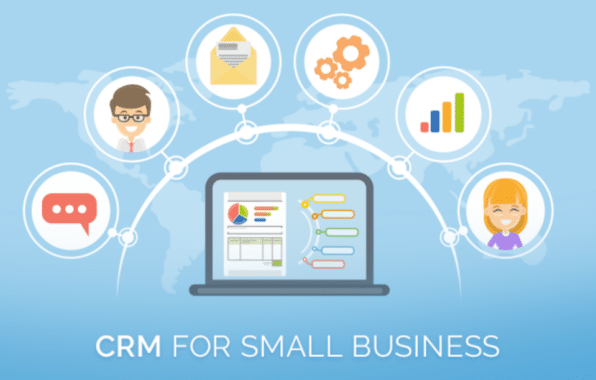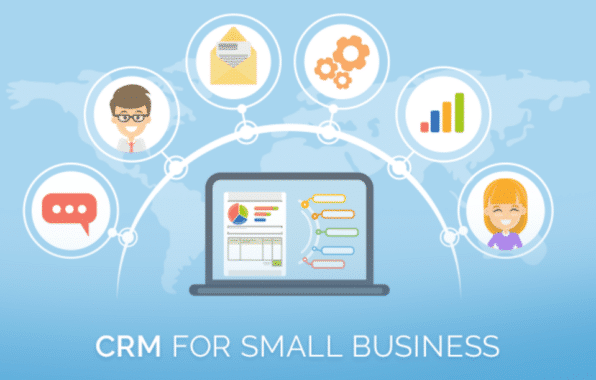CRM for Small Businesses: A Comprehensive Guide to Growing Your Business – Customer Relationship Management (CRM) has become an essential tool for small businesses aiming to grow their customer base, streamline their processes, and improve customer satisfaction. For small businesses, having an effective CRM strategy can make a significant difference by helping to understand customer needs, manage interactions, and ultimately drive sales. In this article, we will explore what CRM is, why it is important for small businesses, how to choose the right CRM system, and best practices for implementation.

What is CRM?
RM stands for Customer Relationship Management, a technology and strategy that helps businesses manage interactions with current and potential customers. It involves using software to organize, automate, and synchronize sales, marketing, customer service, and technical support. While CRM systems are often associated with large corporations, they are equally, if not more, beneficial for small businesses that want to maintain strong relationships with customers and ensure steady growth.
Why CRM is Important for Small Businesses
For small businesses, every customer interaction matters. Without a CRM system, small businesses often rely on manual processes like spreadsheets, email inboxes, or handwritten notes to manage customer information. These methods can be time-consuming, prone to errors, and may not provide the holistic view of customer relationships that a business needs to thrive. Here’s why adopting a CRM is crucial for small businesses:
Improved Customer Retention and Loyalty
A CRM system helps small businesses to track customer interactions, monitor buying behaviors, and predict future needs. By understanding customers’ preferences, businesses can deliver personalized experiences and create targeted marketing campaigns that resonate with them. As a result, customers feel valued, leading to higher retention rates and brand loyalty.
Increased Sales and Revenue
CRM systems streamline the sales process by tracking leads, automating follow-ups, and ensuring that no opportunity is missed. Sales teams can prioritize high-value prospects and allocate resources more effectively. This increased efficiency can lead to higher conversion rates and more revenue for the business.
Enhanced Productivity and Efficiency
With a CRM system in place, small businesses can automate routine tasks like data entry, appointment scheduling, and sending follow-up emails. This automation allows employees to focus on more strategic activities, such as building relationships and closing deals, instead of getting bogged down by administrative tasks.
Better Customer Insights
CRM software collects and organizes data on customer interactions, giving businesses a 360-degree view of their customer base. This information can be used to identify patterns, spot opportunities, and address any issues before they become significant problems. Businesses can use these insights to make informed decisions that positively impact their bottom line.
Centralized Data Management
By consolidating customer data in a single platform, a CRM system eliminates information silos and ensures that all team members have access to the same data. This centralization is crucial for small businesses, where communication and collaboration are key to success.
How to Choose the Right CRM for Your Small Business
Selecting a CRM system for a small business is not a one-size-fits-all decision. Each business has unique needs, budgets, and growth plans, making it important to choose a CRM that aligns with these factors. Here are some important considerations when choosing the right CRM for your small business:
Budget
For small businesses, cost is often a primary concern. Fortunately, many CRM providers offer affordable options specifically designed for small businesses. It’s important to evaluate the features offered by different systems and determine which package provides the best value for the price. Some CRMs offer free versions with limited functionality, while others provide scalable pricing plans that can grow with your business.
Ease of Use
A CRM system should be user-friendly and easy to navigate. If the software is too complex, your team may struggle to adopt it, and the benefits of the CRM could be lost. Look for a CRM that offers an intuitive interface, minimal setup time, and a shallow learning curve.
Customization and Scalability
As your business grows, your CRM needs will likely change. It is crucial to choose a CRM system that can be customized to fit your specific requirements and scaled up to accommodate future growth. This includes the ability to add more users, integrate with other software, and customize workflows.
Mobile Accessibility
For small businesses where team members may need to access information on the go, a CRM with mobile capabilities is essential. Mobile CRM apps allow you to view customer data, track sales, and perform other tasks from your smartphone or tablet, making it easier to stay connected.
Integration with Other Tools
Small businesses often use various tools for accounting, email marketing, project management, and other functions. A CRM that can integrate with these existing tools can streamline workflows and reduce the need for manual data entry.
Customer Support and Training
When implementing a CRM system, it’s important to have access to reliable customer support and training resources. Look for a provider that offers comprehensive onboarding, ongoing training, and responsive customer service to help you get the most out of your CRM.
Best CRM Software for Small Businesses
There are many CRM solutions on the market, but some are particularly well-suited for small businesses. Here are a few popular options:
HubSpot CRM
HubSpot CRM is a popular choice for small businesses due to its free version, which includes features like contact management, deal tracking, and email integration. The system is easy to use, and HubSpot offers premium upgrades for businesses that need more advanced functionality.
Zoho CRM
Zoho CRM is known for its affordable pricing and comprehensive feature set, including sales automation, workflow management, and reporting. It also integrates with other Zoho products, such as Zoho Books and Zoho Projects, making it an ideal choice for small businesses that already use Zoho tools.
Salesforce Essentials
Salesforce Essentials is a scaled-down version of Salesforce’s enterprise-level CRM, designed specifically for small businesses. It offers powerful features like sales automation, email integration, and customer support capabilities. While it may be more expensive than some alternatives, the advanced features may justify the cost for growing businesses.
Pipedrive
Pipedrive is a sales-focused CRM that offers an intuitive interface, customizable pipelines, and automation features to help small businesses close deals faster. It is particularly well-suited for businesses with a sales-driven focus.
Insightly
Insightly combines CRM and project management in one platform, making it a good fit for small businesses that manage both sales and projects. It offers features like lead management, email tracking, and integration with popular tools like Google Apps and Microsoft Office.
Best Practices for Implementing a CRM System
Implementing a CRM system can be a game-changer for a small business, but it requires careful planning and execution. Here are some best practices to ensure a smooth implementation:
Define Your Objectives
Before implementing a CRM, it is important to have a clear understanding of what you want to achieve. Whether your goal is to increase sales, improve customer service, or streamline processes, defining your objectives will help you choose the right features and measure success.
Train Your Team
Training is crucial for successful CRM adoption. Ensure that your team understands how to use the CRM software and is aware of its benefits. This training should be ongoing, with regular updates to keep up with new features and best practices.
Start with a Pilot Program
Before rolling out the CRM system to the entire organization, consider starting with a pilot program involving a small group of users. This allows you to identify any issues, gather feedback, and make necessary adjustments before a full-scale implementation.
Customize the CRM to Fit Your Needs
Take advantage of the customization options provided by the CRM software to align it with your business processes. This may include setting up custom fields, automating workflows, and integrating the CRM with other tools you use.
Monitor Usage and Gather Feedback
After the CRM system is implemented, monitor its usage and gather feedback from your team. Identify any areas where the CRM may not be meeting expectations and make necessary adjustments.
Conclusion
CRM for small businesses is not just a luxury; it is a necessity for those looking to grow and maintain a competitive edge. By adopting the right CRM system, small businesses can better understand their customers, optimize their sales processes, and improve overall efficiency. The key to success lies in choosing a CRM that fits your specific needs, training your team, and continuously optimizing the system to align with your business goals. With a well-implemented CRM, small businesses can build stronger customer relationships and achieve sustainable growth.

